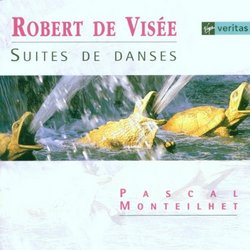| All Artists: Pascal Monteilhet Title: Robert de Visée: Suites de Danses Members Wishing: 0 Total Copies: 0 Label: EMI Import Release Date: 12/23/2002 Album Type: Import Genre: Classical Styles: Chamber Music, Historical Periods, Classical (c.1770-1830) Number of Discs: 1 SwapaCD Credits: 1 UPC: 724356154124 |
Search - Pascal Monteilhet :: Robert de Visée: Suites de Danses
 | Pascal Monteilhet Robert de Visée: Suites de Danses Genre: Classical
|
Larger Image |
CD DetailsSimilar CDs
|
CD ReviewsMusic A Versailles-Suites and Dances -visee Fadi Nakhle | Australia | 03/25/2000 (4 out of 5 stars) "This is an interesting record Critically acclaimed when it was first released.Recorded on nylon trebles and metal spun nylon basses it has a longer ring and warmer sound untypical of a period sounding instrument.Gut strings have a brighter more insicive sound,their but their ring is much shorter than nylon and their duration decreases as it progresses to the basses;which being gut has a much darker brighter tone.It has two Suites not available elseware,the second and the fourth suites.The second piece from the second suite is an Allemande;thought more fully it stated in Rafael Andia's now unavailable cds Allemande Tombeau de M.Franc(is)que a song for dead colleage Franscisco Corbetta.The third and a personal favourite is the Suite in D Major.The fifth piece is a Minuet though in the inseminal recording of Hopkinson Smith,the minuet is replaced, and rightly so by a Gavotte from the second Suite of the Monteilhet recording.Pascal's a sensitive though somewhat melancholy player.Of the few recordings dedicated entirely to Visee, Hopkinson Smith's is it for me" Music from the King of France's Chambre Leslie Richford | Selsingen, Lower Saxony | 03/26/2005 (5 out of 5 stars) "Robert de Visée was, for many years, guitarist to the King of France. He was a contemporary of Couperin, and his surviving works were published mainly in the period from 1680 to 1700. French lutenist Pascal Monteilhet has here chosen a programme of five suites from various sources, including not only the inevitable French dance movements but also some more individual pieces, the longest of which is Visée's four-minute lament on the death of his daughters, a most moving passage. In the excellent notes which accompany this edition the history of the "theorbo" as an instrument is explained and the differences between it and the arch-lute made apparent. Monteilhet uses the reconstruction of a 17th century Italian instrument from Venice, but, as he explains in a special note, equipped with the French system of strings à la Maltot, meaning eight strings in the upper register and six bass resonance strings, thus guaranteeing the particular sonority associated with the French théorbe. Obviously, Monteilhet's decision to use "unwired nylon strings" in the upper register and "metal-wound nylon strings" for the lower is somewhat controversial, but he explains this with his dissatisfaction with the gut strings available today, and, in fact, a number of period instrument musicians would agree with him that our equation of period instruments with "gut strings" is far too simplistic - we simply do not know enough about the manufacture of strings in the 17th and 18th centuries to make dogmatic pronouncements. At all events, the sound of this recording is, to my mind, justification enough for Monteilhet's decision. The recording was made by Radio France in Paris in February, 1992, and the quality is above-average, not quite equalling some of Lutz Kirchhof's lute recordings for Sony Vivarte, perhaps, but surely being more than adequate. I am not a musician myself, so I can hardly comment on Monteilhet's style of playing, but as a listener I found this recording perfectly satisfying and would have no hesitation in recommending it to anyone wanting to become acquainted with Visée or with late French lute music. The King of France had Visée come and play to him at his bedside in the evenings, and today's listener can share in this rare privilege thanks to the careful work done by Pascal Monteilhet for this CD. " Monteilhet is no match for Smith's De Visee Gary J. Wright | San Francisco, CA United States | 07/05/2003 (2 out of 5 stars) "The music sometimes sounds rather muddy in Monteilhet's hands, so that turning to Hopkinson Smith's versions of some of the same pieces immediately seems to clarify the composer's intentions. Apart from Smith, Moreno on Glossa also offers a better introduction to De Visee's fine music than Monteilhet. However, Monteilhet does offer some pieces unavailable elsewhere, which earns him some merit for good intentions."
|

 Track Listings (31) - Disc #1
Track Listings (31) - Disc #1

